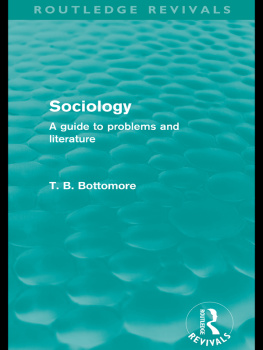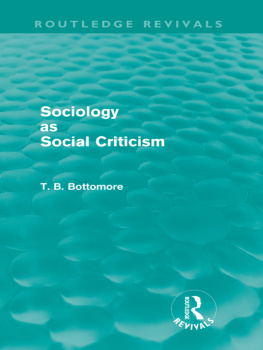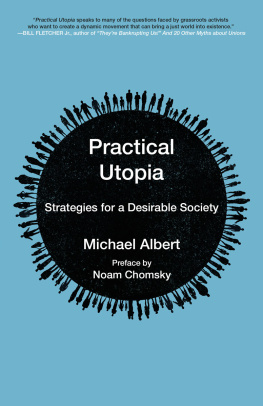Routledge Revivals
Sociology
First published in 1962, this seminal work is an introduction to sociology in a world context, and a sophisticated guide to the major themes, problems and controversies in contemporary sociology. The book remains unique in its organisation and presentation of sociological ideas and problems, in its lack of insularity (its wide coverage of diverse types of society and of sociological thought from various cultural traditions), and in its systematic connection of sociology with the broad themes of modern social and political thought.
A work of authority and mature scholarshipof a consistently high standard.Times Literary Supplement
A book which glows with knowledge, but which is also balanced and literate.Tribune
Sociology
A guide to problems and literature
T.B.Bottomore
First published in 1962
by George Allen & Unwin Ltd
This edition first published in 2010 by Routledge
2 Park Square, Milton Park, Abingdon, Oxon, OX14 4RN
Simultaneously published in the USA and Canada
by Routledge
270 Madison Avenue, New York, NY 10016
Routledge is an imprint of the Taylor & Francis Group, an informa business
This edition published in the Taylor & Francis e-Library, 2010.
To purchase your own copy of this or any of Taylor & Francis or Routledges collection of thousands of eBooks please go to www.eBookstore.tandf.co.uk.
1962 George Allen & Unwin
All rights reserved. No part of this book may be reprinted or reproduced or
utilised in any form or by any electronic, mechanical, or other means, now
known or hereafter invented, including photocopying and recording, or in any
information storage or retrieval system, without permission in writing from the
publishers.
Publishers Note
The publisher has gone to great lengths to ensure the quality of this reprint but
points out that some imperfections in the original copies may be apparent.
Disclaimer
The publisher has made every effort to trace copyright holders and welcomes
correspondence from those they have been unable to contact.
ISBN 0-203-85134-X Master e-book ISBN
ISBN 13: 978-0-415-57893-6 (hbk)
ISBN 13: 978-0-203-85134-0 (ebk)
ISBN 10: 0-415-57893-0 (hbk)
ISBN 10: 0-203-85134-X (ebk)
SOCIOLOGY
A Guide to Problems and Literature
BY
T.B.BOTTOMORE
LONDON
UNWIN UNIVERSITY BOOKS
FIRST PUBLISHED IN 1962
This edition published in the Taylor & Francis e-Library, 2010.
To purchase your own copy of this or any of Taylor & Francis or Routledges collection of thousands of eBooks please go to www.eBookstore.tandf.co.uk.
SECOND IMPRESSION 1963
THIRD IMPRESSION 1964
FOURTH IMPRESSION 1965
This book is copyright under the Berne Convention. Apart from any fair dealing for the purpose of private study, research, criticism or review, as permitted under the Copyright Act, 1956, no portion may be reproduced by any process without written permission. Enquiry should be made to the publisher.
George Allen & Unwin 1962
UNWIN UNIVERSITY BOOKS
George Allen and Unwin Ltd
40 Museum Street, London, W.C.1
ISBN 0-203-85134-X Master e-book ISBN
FOR MARY
PREFACE
The occasion for this book was a request to UNESCO from the Indian National Commission for UNESCO, for the preparation of a guide to sociology which would present sociological concepts, theories and methods in relation to the culture and institutions of Indian society. Such a book, it was thought, would provide a better introduction to the subject for Indian students than the existing textbooks, which deal very largely with the Western societies.
When the Social Sciences Department of UNESCO invited me to write the book I accepted readily. In the first place, I had already a general interest in the under-developed countries and in the social changes accompanying their industrialization; and I was particularly interested in the economic and social development of India. Moreover, I considered that an attempt to set out the principles and methods of sociology in their bearing upon the study of Indian society might be illuminating not only for Indian students, but for others. It would show how far the accepted sociological concepts and categories are adequate and universally valid, and would reveal some of the major difficulties in classification, comparison and generalization. Finally, I have used this opportunity to introduce sociology in a way which seems to me most likely to be useful and stimulating for the student. Throughout the book I have aimed to formulate the difficult theoretical problems with which sociology is concerned, and to show how sociologists have tried to reduce the complexity of the problems and to make them amenable to scientific enquiry. As a prelude to this I have discussed in the first part of the book some general difficulties of sociological theory and method.
After the first version of this book had been written I had the opportunity to spend several months in India and to discuss it with Indian scholars. I have benefited greatly from their criticisms and suggestions in re-writing the book. If I do not mention them by name here it is because there are so many who helped me.
T.B.B.
CONTENTS
PART ONE
THE SCOPE AND METHODS OF SOCIOLOGY
CHAPTER 1
THE STUDY OF SOCIETY
For thousands of years men have observed and reflected upon the societies and groups in which they live. Yet sociology is a modern science, not much more than a century old. Auguste Comte, in his classification of the sciences, made sociology both logically and chronologically posterior to the other sciences, as the least general and most complex of all And one of the greatest of modern anthropologists observed that the science of human society is as yet in its extreme infancy.
It is true that we can find, in the writings of philosophers, religious teachers, and legislators of all civilizations and epochs, observations and ideas which are relevant to modern sociology. Kautilyas Arthashstra and Aristotles Politics analyze political systems in ways which are still of interest to the sociologist. Nevertheless, there is a real sense in which a new science of society, and not merely a new name,
The circumstances in which sociology appeared may be distinguished into intellectual and material, and I shall discuss them in turn. Naturally, they were interwoven, and an adequate sociological history of sociology, which has not yet been attempted, would have to take account of these interconnections. In this brief introduction I can only mention some of the more important factors.
1A.R.Radcliffe-Brown, Structure and Function in Primitive Society (1952).
2It was Comte who named the new science Sociology. At one time he regretted the hybrid character of the word, derived from the Latin socius and Greek logos, but later suggested that there is a compensationfor this etymological defect, in the fact that it recalls the two historical sourcesthe one intellectual, the other socialfrom which modern civilization has sprung. System of Positive Polity (trans. J.H.Bridges), Vol. I, p. 326.
3The histories of social thought emphasise unduly its continuity. It would be helpful and illuminating to have for sociology and the modern social sciences, an account similar to that which H.Butterfield has provided for the natural sciences in









